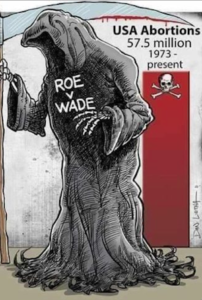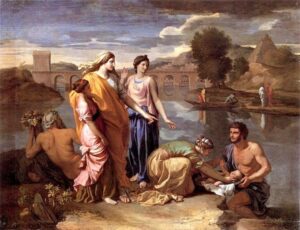 Society has been reduced to those living in the present; but in being reduced, it has excluded the democracy of the dead and unborn. We, in the present, must fight for this most obscure of all classes.
Society has been reduced to those living in the present; but in being reduced, it has excluded the democracy of the dead and unborn. We, in the present, must fight for this most obscure of all classes.
In the abortion debate, one of the pro-choice arguments is based on the idea of “personhood.” Personhood is the status a fetus receives, “after a fetus becomes ‘viable’ (able to survive outside the womb) or after birth, not at conception.” Essentially, to those in favor of abortion, the unborn are not living people, which means they have no rights. Only once the unborn enters this world do abortion advocates believe an infant has rights.
This seems peculiar, as one of the pillars of liberalism is the language of rights. Liberals believe in a seemingly endlessly-expanding universe of rights. For a good example of this, note the rhetoric of Senator Bernie Sanders. According to Senator Sanders, healthcare, education, and even Wi-Fi are all natural rights of Man.
The source of the liberal moral foundation of rights endowed to Man in this fashion is Thomas Paine, specifically his book, The Rights of Man. Yet oddly, in this instance, The Rights of Man actually strips the unborn of their rights.
Paine advocated for the emancipation of the individual from the oppressive ties of tradition, particularly the notion that the dead have any authority over the living:
I am contending for the rights of the living, and against their being willed away, and controlled and contracted for, by the manuscript assumed authority of the dead, and Mr. Burke is contending for the authority of the dead over the rights and freedom of the living.
Paine desired to free himself from the oppressive dead-weight of the past, enabling the present generation to live their lives freely, unencumbered by the deceased.
The “Mr. Burke” Paine references is Edmund Burke, the first conservative. He refers to a passage from Edmund Burke’s brilliant and enduring work, Reflections On the Revolution in France:
Society is indeed a contract…. It is to be looked on with other reverence; because it is not a partnership in things subservient only to the gross animal existence of a temporary and perishable nature. It is a partnership in all science; a partnership in all art; a partnership in every virtue, and in all perfection. As the ends of such a partnership cannot be obtained in many generations, it becomes a partnership not only between those who are living, but between those who are living, those who are dead, and those who are to be born.
Burke understood that the dead and the unborn are as much a part of civilization as the living. We are not born free and independent, but rather are born into a context built for us by our ancestors. This context is maintained by the complicated web of duties to piety and posterity.
Sir Roger Scruton, a spiritual heir to Burke, understood the nature of this relationship:
The dead and the unborn are as much members of society as the living. To dishonour the dead is to reject the relation on which society is built – the relation of obligation between generations. Those who have lost respect for their dead have ceased to be trustees of their inheritance. Inevitably, therefore, they lose the sense of obligation to future generations. The web of obligations shrinks to the present tense.
When the dead are no longer believed to be a part of civilization, the living no longer believe they have an obligation to future generations. When the web of obligations shrinks to the present, life denigrates into selfish indulgence. A sad, yet pithy, way of articulating the consequences of the web of obligations, having been shrunk to only include those living in the present, is by saying that “living for oneself” and “living for nobody” become hard to distinguish between.
The duties of motherhood and the lifelong commitments that come with child rearing are the quintessential examples of living selflessly for others. The duties of motherhood entail sacrifice in the present for the benefit of the future. The sacrifices our parents and ancestors made for our benefit are not, nor cannot be, forgotten in the present or future. The love for our children and the drive to nurture them for posterity are among the most basic and fundamental elements of the human condition.
Yet due to Paine, we in the present live alone in the present. In a world in which only those living in the present are in fact present, only those existing in the current temporal moment matter. The past is obsolete, and the future is someone else’s problem. The dead and the unborn have no place in society; only the living have their place. The needs and legacies of the dead and unborn are irrelevant. The absence of the past in the present is a notion Edward Shils addresses in Tradition:
To have experienced the disappearance of one’s own biological and cultural ancestors… without the compensating acquisition of new ones confines a person in his own generation… the sources of unease are not perceived because the vocabulary available to describe this experience is very poor.
The missing connection to our ancestors is what makes our connection to the unborn so tenuous.
A link connecting the generations is the essence of what G.K. Chesterton understood as being tacit in a societal contract among generations. Chesterton referred to this contract as, “the democracy of the dead.” Chesterton argued:
Tradition refuses to submit to the small and arrogant oligarchy of those who merely happen to be walking about. All democrats object to men being disqualified by the accident of birth; tradition objects to their being disqualified by the accident of death.
In every other matter, Paine’s legacy of rights is paramount to the contemporary liberal. The thought of discriminating based on characteristics of birth such as race, gender, sexual orientation, or immigration status is unthinkable to the contemporary liberal. Yet, when it comes to discriminating against the dead and the unborn, they are able to easily do so without any weight on their collective conscience.
Paine’s work is the basis for this sentiment, and sadly it manifests itself in the abortion movement. Ideally, the Burkean perspective would explain to the zeitgeist why the dead and unborn have the same rights and considerations as the living. Unfortunately, Paine erased the dead from our lives, which in turn causes the living to erase the unborn today.
 We, in the present, must fight for the most obscure of all classes: the dead and the unborn. These members of society—and make no mistake, they are as much members of society as the living—necessitate our help more than others for the simple reason that they cannot speak for themselves. It is our duty to honor the legacy of our ancestors and keep them in our thoughts in the present. This will enable the unborn in the present and future to survive.
We, in the present, must fight for the most obscure of all classes: the dead and the unborn. These members of society—and make no mistake, they are as much members of society as the living—necessitate our help more than others for the simple reason that they cannot speak for themselves. It is our duty to honor the legacy of our ancestors and keep them in our thoughts in the present. This will enable the unborn in the present and future to survive.
By invalidating Paine and those who follow his indifferent ideology, we can return the status of the dead to our collective conscience. By returning the dead to our collective conscience, we recuperate our obligation to the unborn.
We have this duty because neither the dead nor the unborn have a voice of their own. If the dead and the unborn could speak to us now, there would be no doubt as to what they would say: “What the dead had no speech for, when living, / They can tell you, being dead: the communication / Of the dead is tongued with fire beyond the language of the living.”
Abortion is a fundamental violation of the natural rights of human beings. We must fight it at all costs. Not just for the unborn, but for the entire web of obligations on which society is built.
Written by Steven Kessler for The Imaginative Conservative ~ May 24, 2019.
